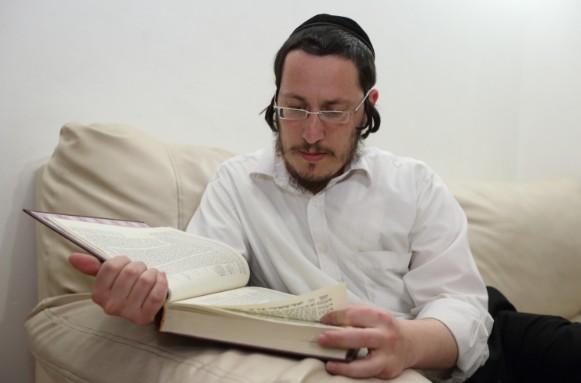Personal Stories
Saving a Life Through Kindness: The Remarkable Journey of a Kidney Donor
A story of faith, bravery, and the unexpected blessings that followed a selfless act
- Akiva Yamini
- |Updated

It was a moving night unlike any other. On the creaky bed in a dark hospital room lay a young kollel student, his mind overflowing with thoughts. Excitement pulsed through him and his heart was more awake than ever. In just a few hours, he knew, he would be brought into the operating room, where he would part with one of his kidneys — donating it to a person he did not even know.
These moments, which would fill any normal person with deep fear and anxiety, were wrapped for him in emotion. He struggled to hold back the tears choking his throat. He felt that the decision he had made would “save a world,” as the Sages say. He had not imagined that this is how he would feel in the final hours before such a major surgery. In a sudden moment of elevation, he rose from his bed, took a pen and paper, and began to write.
A Prayer From the Depths of His Heart
"I thank You, Hashem, my God and the God of my forefathers," he began, "for creating me out of nothing, body, soul, spirit, and breath…"
He wrote of the suffering of kidney patients, the limited help dialysis can offer, and the miracle that doctors were able to devise a way to transplant a healthy kidney from one person into another. He continued:
"At this moment, when I am healthy in body and mind, and You have granted me two kidneys while another of Your children needs one of them to save his life… strengthen me so I will not falter with fear or worry. Let this act be considered as if I had offered a sacrifice upon the altar..."
He ended with a heartfelt plea that the remaining kidney should guide him only toward good and upright paths.
Writing the prayer filled him with even deeper emotion. Now he felt confidence as well — an inner calm. Although fear had never been truly present for him, he now sensed a profound spiritual security.
Heading Into Surgery
"In the morning, I was taken to the operating room," recalls Rabbi Yehuda Rosenberg. "As they began the anesthesia, I whispered the prayer. I thought only of the great kindness that would come from this act. Those were among the happiest moments of my life."
Roughly half a year earlier, Rabbi Rosenberg — a young kollel scholar living in Kiryat Sefer, had made an unusual decision: he contacted Matnat Chaim, Israel’s kidney-donation organization, to ask that his name be added to the donor registry.
He soon learned that such requests were far more common than he imagined. Dozens — perhaps hundreds, had done so before him. For the organization’s staff, his request was nothing surprising.
How the Journey Began
The inspiration came after reading articles describing the terrible suffering of people waiting endlessly for a kidney. “I realized how much pain they endure,” he says. “After learning about the relatively simple nature of kidney donation, the desire to help began to grow.”
He and his wife made the decision together. He spoke to his doctor, who told him there was no danger to a healthy donor. Then he turned to the rabbis who had guided him throughout his life — his father, Rabbi Sariel Rosenberg, and his grandfather, the great Rabbi Nissim Karelitz.
“My father didn’t tell me to do it, but he said, ‘It is a tremendous mitzvah.’ At that moment, I knew I had my answer.”
The Support of Matnat Chaim
Matnat Chaim guided him through every step, including medical tests, scheduling, and emotional support. “Their help strengthened me throughout the process,” he says.
He met with a social worker and a psychologist who needed to verify that he understood the decision. “They were surprised when I told them I was doing this purely because it's a mitzvah. But for me, it was simple.”
 (Photo: Yaakov Nehomi)
(Photo: Yaakov Nehomi)Meeting the Recipient
The first meeting with the man who would receive his kidney was emotional, and slightly awkward. “He didn’t know how to thank me,” Rabbi Rosenberg recalls. “I told him, ‘I’m not doing this for you — I’m doing it for myself, to fulfill a mitzvah.’ He was relieved and moved.”
As time passed, the recipient’s deteriorating condition made the urgency even clearer.
Together, before the surgery, the donor and recipient visited leading Torah giants: Rabbi Aharon Leib Shteinman, Rabbi Chaim Kanievsky, and the Vizhnitzer Rebbe. “The Rebbe was deeply moved,” Rosenberg says.
The Night Before Surgery
That night, in the hospital, the prayer was written. “I felt like someone preparing to offer a sacrifice in the Holy Temple,” he says. “It was a feeling of fulfillment, excitement, and anticipation.”
The Surgery and Aftermath
The surgery took a few hours. “When I woke up, I asked immediately about the recipient. They told me the transplant was successful and the kidney had already begun functioning during the operation. I was overwhelmed with gratitude.”
His recovery was quick; within a week he was back to teaching in the cheder and learning in kollel.
A Miraculous Turn: Saving Two Lives
A week after the operation, his father came to visit. Rabbi Rosenberg showed him the prayer — and his father unexpectedly cried.
Days later, during a routine checkup, doctors discovered that his father was on the brink of a massive heart attack. He was rushed to emergency surgery and his life was saved.
“When I visited him, he said, ‘I want to thank you. Because you saved a Jewish life, Hashem saved mine.’”
A Life-Changing Experience
Rabbi Rosenberg emphasizes that he does not try to convince anyone to donate — only to learn the facts.
“I encourage people to read, to learn about the process. It is simple, safe, and saves lives. If a person can do this — with his family’s support, shouldn’t he at least consider it?”
The reward, he says, is immediate. “The feeling of fulfillment is indescribable. To see a person who was once attached to dialysis machines return to life — there is nothing like it.”
And with the miracle of his father’s survival, he felt the mitzvah’s ripple effect even more deeply.
Hoping to Inspire Others
“I truly hope my story, and the stories of many other donors, will open hearts. There are so many waiting for someone to save their lives. If one person decides to donate because of what they read — another world has been saved.”

